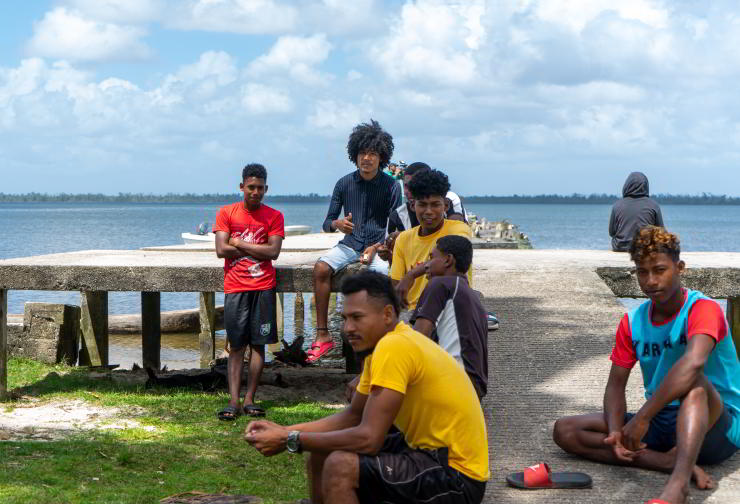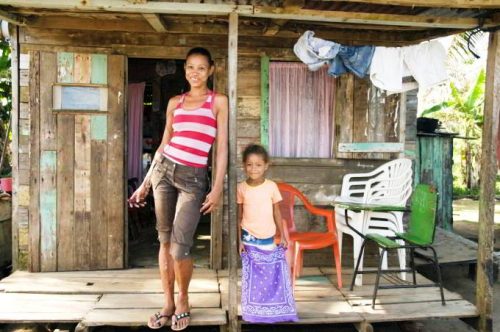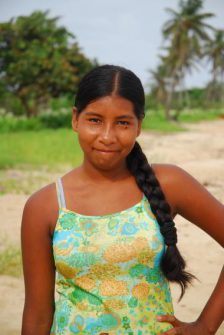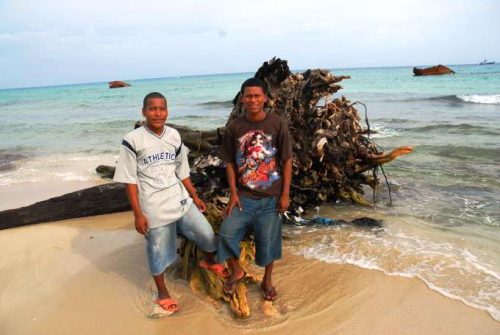Nicaragua. Silent and silenced minority.

The constitution and laws should protect their rights. In reality, this is not the case: because of confiscated land, 70% of these Afro-descendants live below the poverty line, their language is threatened with extinction and their human rights are systematically violated.
The Garifuna are an Afro-indigenous people originally from the island of Saint Vincent, but now present along the Caribbean coast of Central America, in countries such as Honduras, Belize, Guatemala and Nicaragua. They are descendants of escaped African slaves and indigenous peoples who mixed in the 17th and 18th centuries.

Mother and daughter in front of the house in Big Corn Island. The Garifuna are a significant minority in the country. 123rf
Garifuna culture is rich in oral traditions, music, dance and a language that combines African, indigenous and colonial elements. In Nicaragua, the Garifuna are a significant minority in the autonomous region of the northern Caribbean coast, where they live mainly from fishing, agriculture and trade. They are a declining population, estimated at between 2,000 and 3,000 people; but their culture and identity
are deeply rooted.
Unenforced Constitution
Under the government of Daniel Ortega in power in Nicaragua since 2006, the situation of the Garifuna has become increasingly complicated. While the Nicaraguan Constitution and subsequent laws have recognized the collective rights of indigenous and Afro-descendant peoples – including the Garifuna – their implementation has often been lacking. Many challenges have been faced.
Territorial conflicts: The Garifuna have historically occupied coastal territories rich in natural resources, making them vulnerable to invasion by settlers and external economic interests. A significant example of territorial conflict occurred in the Orinoco community, where the Garifuna denounced the invasion of their lands by settlers from the interior of the country, often with the implicit support of local authorities. These settlers seek new lands for agriculture and ranching, leading to violent clashes and deforestation of ancestral areas. Despite legislation that is supposed to protect indigenous territories, between 2015 and 2020, more than 500 hectares of Garifuna lands were illegally occupied by settlers, putting at risk the livelihoods of communities that depend on these lands for fishing and agriculture.

A Garifuna girl. The Garifuna culture is rich in oral traditions, music and dance. Their language combines African, indigenous and colonial elements. File swm
Economic marginalization: Despite Ortega’s government’s stated commitment to the inclusion of indigenous and Afro-descendant populations, the Garifuna continue to live in extreme poverty. Their communities in Nicaragua have limited access to essential services such as education and healthcare. According to data collected by local organisations, more than 70% of the Garifuna population live below the poverty line, and access to higher education is almost non-existent. The lack of adequate infrastructure and economic opportunities has forced many young people to migrate to the cities, weakening local communities. Furthermore, the Covid-19 pandemic has exacerbated these conditions, with a reduction in revenues from tourism and fishing, the main sources of income for the Garifuna.
Cultural threats: Their culture, which, as mentioned, includes music, dance, language and religious traditions, is at risk of extinction due to globalization and the lack of institutional support. The Garifuna language, in particular, is in danger: it is classified as “seriously endangered” by UNESCO, with a growing number of young people no longer speaking it fluently. Schools in Garifuna communities often do not offer instruction in the native language, contributing to its erosion. Furthermore, the spread of mass culture and the lack of specific cultural programs are weakening the traditions of this minority. Only 40% of young Garifuna actively participate in cultural ceremonies and traditions, compared to 80% of the previous generation.

Two young fishermen at Corn Island. Only 40% of young Garifuna actively participate in cultural ceremonies and traditions. File swm
Political Repression: Ortega’s government has repeatedly been accused of repressing dissident voices, including Garifuna community leaders who denounce human rights violations and the loss of their lands. In 2019, several Afro-Indigenous leaders were arrested or intimidated after participating in demonstrations against the occupation of their lands and lack of government protection. According to an Amnesty International report, at least five Garifuna leaders were detained without due process between 2018 and 2023, and their communities faced increased threats and acts of violence from government-linked armed groups. Fear of reprisals has led many to avoid political involvement, further weakening communities’ ability to defend their rights. (Photo: Nicaragua. Karata. Afro-descendant youth on a pier on the Caribbean coast. Shutterstock/cfalvarez)
Jairo Agudelo Taborda and Davide Riccardi



